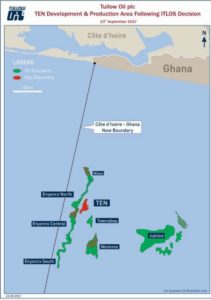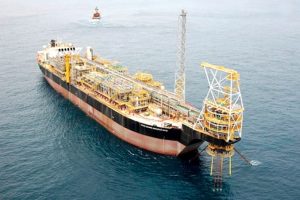
Accra, September 27, 2017//-Ghana is said to gain 80 square kilometres (sqkm) of territorial space after the delimitation of its maritime boundary with Cote d’Ivoire.
The Minister of Energy, Boakye Agyarko who disclosed this to journalists in Accra explained:“Between 29 and 196 nautical miles, Ghana makes a gain of 121 square kilometres because the new border is on the right of our original claim.
“In a nutshell, the net gain made by Ghana is about 80 square kilometres of additional territorial space”, he stated.
Mr Agyarko however noted that the “country made some marginal losses at certain points following the creation of the new border, they are insignificant and will not affect oil production”.
Ghana, on Saturday, September 23, 2017, emerged victorious in its three-year long maritime boundary dispute with it neighbour Cote d’Ivoire.
The Special Chamber of the International Tribunal for the Law of the Sea (ITLOS) was set up to hear the dispute unanimously declared that Ghana had not violated Cote d’Ivoire’s sovereign rights with its oil exploration activities.
It also held that Ghana was not financially obligated to Cote d’Ivoire with respect to those activities to give rise to the issue of reparation (compensation).
The tribunal further rejected Cote d’Ivoire’s claim that Ghana disobeyed its April 25, 2015 preliminary orders, which directed that new wells should not be drilled in the disputed area.
Read full ruling here: full-judgement-itlos-ruling-ghana-ivory-coast-maritime-dispute/
The ruling has lifted the initial moratorium placed on Ghana which prevented it from drilling more wells in the disputed area .
This therefore implies that Tullow Oil Plc can now begin to add 13 more wells to improve its production, an estimated addition of 80,000 barrels per day.
“30,000 additional barrels of oil times 50 dollars is a lot of money that can keep the free SHS, health insurance and the others going”, the Minister said.
Tullow to resume production
Tullow Oil plc has stated that it will work with the Ghanaian government to put in place the necessary permits to allow the restart of development drilling in the Tweneboa, Enyira and Ntome (TEN) fields in Ghana.
An elated CEO of Tullow Paul McDade said after the Special Chamber of the International Tribunal of the Law of the Sea (ITLOS) ruling on Saturday 23, September 2017 which in favour of Ghana that, “Tullow looks forward to continuing to work constructively with the Governments of both Ghana and Côte d’Ivoire following the conclusion of this process.”
“While the TEN fields have performed well during the period of the drilling moratorium, we can now restart work on the additional drilling planned as part of the TEN fields’ plan of development and take the fields towards their full potential,” he added.
Tullow expects to resume drilling around the end of the year which will allow production from the TEN fields to start to increase towards the FPSO design capacity of 80,000 bopd, Mr McDade said.
The oil company’s statement is in response to the Special Chamber of the International Tribunal of the Law of the Sea (ITLOS) in Hamburg’s ruling Saturday with regard to the maritime boundary dispute between Ghana and Côte d’Ivoire.
According to ITLOS, the new maritime boundary as determined by the tribunal does not affect the TEN fields.
The tribunal accepted that the equidistance measurement be used and according to Petroleum Economist, the new boundary line determined the Tribunal “does not materially affect Ghana’s interest.”
Currently, three oil fields, the TEN oil fields are located in the area and formed the subject matter of the maritime dispute between the two countries.
Ruling saves Ghana
Economists and oil experts said Ghana was going to lose an estimated $49 billion if the ITLOS ruling which adjudicated on the maritime boundary dispute had gone in favour of Cote d’Ivoire.
According to them, the ITLOS court based in Hamburg would have ordered Ghana to pay reparation to Cote d’Ivoire from the date it (Ghana) commenced the drilling of oil in commercial quantities in 2010.
Ghana filed the claim in 2014 after about 10 negotiations with Cote d’Ivoire over the maritime boundary had failed.
The West African neighbour then filed a counter claim, including reparation, whilst at the same time laying claim to portions of huge oil and gas reserves located around the maritime boundary between the two countries in the Western Region.
When Ghana discovered oil in commercial quantities in 2007, Cote d’Ivoire said Ghana was straying into its waters in the course of the exploration exercise at West Cape Three Points.
Cote d’Ivoire came again with a renewed set of claims in 2010, including compensation from Ghana for entering into its territory when the Dzata-1 Deepwater Well was discovered by Vanco.
Ghana then constituted the Ghana Boundary Commission in March 2010, after Cote d’Ivoire had petitioned the United Nations over the oil exploratory activities and requested for a demarcation of the maritime boundary.
African Eye Report



